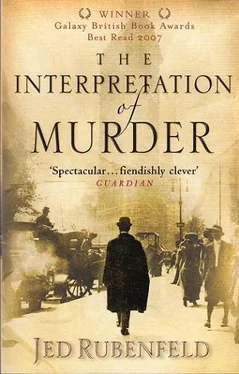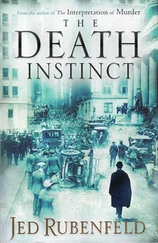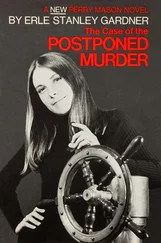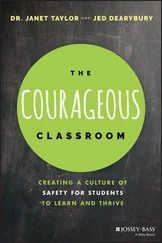Jed Rubenfeld - The Interpretation of Murder
Здесь есть возможность читать онлайн «Jed Rubenfeld - The Interpretation of Murder» весь текст электронной книги совершенно бесплатно (целиком полную версию без сокращений). В некоторых случаях можно слушать аудио, скачать через торрент в формате fb2 и присутствует краткое содержание. Жанр: Исторические приключения, на английском языке. Описание произведения, (предисловие) а так же отзывы посетителей доступны на портале библиотеки ЛибКат.
- Название:The Interpretation of Murder
- Автор:
- Жанр:
- Год:неизвестен
- ISBN:нет данных
- Рейтинг книги:5 / 5. Голосов: 1
-
Избранное:Добавить в избранное
- Отзывы:
-
Ваша оценка:
- 100
- 1
- 2
- 3
- 4
- 5
The Interpretation of Murder: краткое содержание, описание и аннотация
Предлагаем к чтению аннотацию, описание, краткое содержание или предисловие (зависит от того, что написал сам автор книги «The Interpretation of Murder»). Если вы не нашли необходимую информацию о книге — напишите в комментариях, мы постараемся отыскать её.
The Interpretation of Murder — читать онлайн бесплатно полную книгу (весь текст) целиком
Ниже представлен текст книги, разбитый по страницам. Система сохранения места последней прочитанной страницы, позволяет с удобством читать онлайн бесплатно книгу «The Interpretation of Murder», без необходимости каждый раз заново искать на чём Вы остановились. Поставьте закладку, и сможете в любой момент перейти на страницу, на которой закончили чтение.
Интервал:
Закладка:
'That is opposite,' said Ferenczi. 'A puritan society should ban us.'
'It will ban you,' said Jung, laughing out loud, 'as soon as it figures out what we are saying.'
'America puritan?' Brill put in. 'The devil was more puritan.'
'Quiet, all of you,' said Rose Brill, a dark-haired woman with firm, no-nonsense eyes. 'Let Dr Younger explain what he meant.'
'No, wait,' said Freud. 'There is something else Younger wants to say. What is it, my boy?'
We trundled down the four flights of stairs as quickly as we could. The more he heard of the affair, the more intrigued Freud became, and when he learned of the mayor's personal involvement, he was as excited as I to get downtown, notwithstanding the hour. The motorcar being a four-seater, there was one extra place, so Freud decided Ferenczi would accompany us. Freud had first invited Jung, who seemed strangely uninterested and declined; he had not even come down to the street.
Just before we drove off, Brill said, 'I don't like your leaving Jung here. Let me go get him; you can squeeze him in and drop him at the hotel.'
'Abraham,' Freud replied with surprising severity, 'I have told you repeatedly how I feel about this. You must overcome your hostility to Jung. He is more important than the rest of us put together.'
'It's not that, for heaven's sake,' protested Brill. 'I've just given the man dinner in my own home, haven't I? It's his — condition — I'm talking about.'
'What condition?' asked Freud.
'He's not right. He's flushed, overly excited. Hot one minute, cold the next. Surely you noticed. Some of what he says makes no sense at all.'
'He's been drinking your wine.'
'That's another thing,' said Brill. 'Jung never touches alcohol.'
'That was Bleuler's influence,' Freud remarked. 'I've cured him of it. You don't object to Jung's drinking, Abraham?'
'Certainly not. Anything is better than Jung sober. Let's keep him drunk all the time. But there's something unsettling about him. From the moment he came in. Did you hear him ask why my floor was so soft — my wood floor?'
'You are imagining things,' said Freud. 'And behind the imagination there is always a wish. Jung is merely unused to alcohol. Just make sure he gets back to the hotel safely.'
'Very well.' Brill bade us good luck. As we pulled away, he called out, 'But there can also be a wish not to imagine.'
In the open-roofed car, rattling down Broadway, Ferenczi asked me if it was normal in America to eat a melange of apples, nuts, celery, and mayonnaise. Rose Brill had evidently served her guests a Waldorf salad.
Freud had fallen silent. He appeared to be brooding. I wondered if Brill's comments were troubling him; I myself had begun to think something might be wrong with Jung. I also wondered what Freud meant when he said that Jung was more important than the rest of us put together.
'Brill is a paranoiac,' Ferenczi said abruptly, addressing Freud. 'It is nothing.'
'The paranoid is never entirely mistaken,' Freud replied. 'Did you hear Jung's slip?'
'What slip?' said Ferenczi.
'His slip of the tongue,' answered Freud. 'He said, "America will ban you" — not us but you.'
Freud relapsed into silence. We took Broadway all the way down to Union Square, then Fourth Avenue to the Bowery Road through the Lower East Side. As we passed the closed stalls of the Hester Street market, we had to slow down. Although it was nearly eleven, Jewish men crowded the streets, wearing their long beards and peculiar outfits, black from head to foot. Perhaps it was too hot to sleep in the airless, crammed tenements in which so many of the city's immigrants lived. The Jews walked arm in arm or gathered in small circles, with much gesturing and loud disputation. The sound of their mongrel low German, which the Hebrews call Yiddish, was everywhere.
'So this is the New World,' Freud observed from the front seat, not favorably. 'Why on earth would they come so far, only to recreate what they left behind?'
I hazarded a question: 'Are you not a religious man, Dr Freud?'
It was infelicitous. At first I thought he hadn't heard me. Ferenczi answered instead: 'It depends on what is meant by religious. If, for example, religious means believing God is gigantic illusion inspired by collective Oedipal complex, Freud is very religious.'
Freud now fixed on me for the first time the piercing gaze I had seen on the quay. 'I will tell you your thought process in asking me that,' he said. 'I asked why these Jews had come here. It occurred to you to say They came for religious freedom, but you reconsidered, because it seemed too obvious. You then reflected that if I, a Jew, could not see that they came for religious freedom, it must be that religion does not signify much for me — indeed, so little that I failed to see how important it is for them. Hence your question. Do I have it right'
'Completely,' I replied.
'Not to worry,' interposed Ferenczi. 'He does this to everyone.'
'So. You ask me a direct question,' said Freud; 'I will give you a direct answer. I am the deepest of unbelievers. Every neurosis is a religion to its owner, and religion is the universal neurosis of mankind. This much is beyond doubt: the characteristics we attribute to God reflect the fears and wishes we first feel as infants and then as small children. Anyone who does not see that much cannot have understood the first thing about human psychology. If it is religion you are looking for, do not follow me.'
'Freud, you are being unfair,' said Ferenczi. 'Younger did not say he was looking for religion.'
'The boy has taken an interest in my ideas; he may as well know their implications.' Freud scrutinized me. All at once, the severity disappeared, and he gave me an almost fatherly look. 'And as I may possibly take an interest in his, I return the question: are you a religious man, Younger?'
To my embarrassment, I did not know how to respond. 'My father was,' I said.
'You answer a question,' Ferenczi replied, 'different from the one that was put.'
'But I understand him,' said Freud. 'He means: because his father believed, he is inclined to doubt.'
'That's true,' I said.
'But he also wonders,' Freud added, 'whether a doubt so founded is a good doubt. Which inclines him to believe.'
I could only stare. Ferenczi asked my question. 'How can you possibly know that?'
'It all follows,' answered Freud, 'from what he told us last night: that going into medicine was his father's wish, not his own. And besides,' he added, taking a satisfied pull at his cigar, 'I felt the same way when I was younger.'
With its grand marble facade, Greek pediments, and fantastic dome, softly lit by streedamps, the new police headquarters at 24 °Centre Street looked more like a palace than a municipal building. Passing through a pair of massive oak doors, we found a uniformed man behind a semicircular desk raised up to chest level. Electrical lights cast a yellow glow around him. He cranked up a telephonic device, and soon enough we were greeted by Mayor McClellan, together with an older, worried-looking, potbellied gentleman named Higginson, who turned out to be the Actons' family doctor.
Shaking each of us by the hand, McClellan apologized to Freud profusely for causing him so dreadful an inconvenience. 'Younger tells me you are also an expert on ancient Rome. I will give you my book on Venice. But I must take you upstairs. Miss Acton is in the most lamentable condition.'
The mayor led us up a marble staircase. Dr Higginson talked a good deal about the measures he had taken — none of which sounded harmful, so we had some luck there. We entered a large office in the classic style, with leather chairs, a good deal of brass, and an imposing desk. Behind this desk, looking much too small for it, a girl was seated, wrapped in a light blanket, with a policeman on either side of her.
Читать дальшеИнтервал:
Закладка:
Похожие книги на «The Interpretation of Murder»
Представляем Вашему вниманию похожие книги на «The Interpretation of Murder» списком для выбора. Мы отобрали схожую по названию и смыслу литературу в надежде предоставить читателям больше вариантов отыскать новые, интересные, ещё непрочитанные произведения.
Обсуждение, отзывы о книге «The Interpretation of Murder» и просто собственные мнения читателей. Оставьте ваши комментарии, напишите, что Вы думаете о произведении, его смысле или главных героях. Укажите что конкретно понравилось, а что нет, и почему Вы так считаете.












